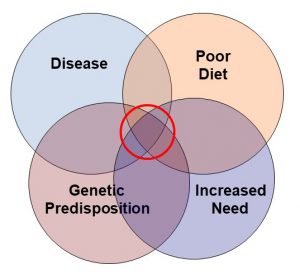Why Are Omega-3s So Controversial?
Author: Dr. Stephen Chaney
 I don’t need to tell you that omega-3s are controversial. Some experts confidently tell you that omega-3s significantly reduce your risk of heart disease and may reduce your risk of cancer and other diseases. Other experts confidently tell you that omega-3s have no effect on heart disease or any other disease. They claim that omega-3 supplements are no better than “snake oil”.
I don’t need to tell you that omega-3s are controversial. Some experts confidently tell you that omega-3s significantly reduce your risk of heart disease and may reduce your risk of cancer and other diseases. Other experts confidently tell you that omega-3s have no effect on heart disease or any other disease. They claim that omega-3 supplements are no better than “snake oil”.
The problem is that each camp of experts can cite published clinical studies to support their claims. How can that be? How can clinical studies come to opposite conclusions on such an important topic? The problem is that it is really difficult to do high quality clinical studies on omega-3s. I will discuss that in the next section.
The question of whether omega-3s affect life span has also been controversial. Heart disease and cancer are the top two causes of death in this country. So, if omega-3s actually reduced the risk of heart disease and cancer, you might expect that they would also help us live longer. Once again, there are studies on both sides of this issue, but they are poor quality studies.
We need more high-quality studies to clear up the controversies surrounding the health benefits of omega-3s. I will report on one such study in this issue of “Health Tips From The Professor”. But first let me go into more depth about why it is so difficult to do high-quality studies with omega-3 fatty acids.
Clinical Studies 101: Why Are Omega-3s So Controversial?
 I have covered this topic in previous issues of “Health Tips From the Professor”, but here is a quick summary.
I have covered this topic in previous issues of “Health Tips From the Professor”, but here is a quick summary.
- Randomized, placebo controlled clinical trials (RCTs) are considered the gold standard for evidence-based medicine, but they ill-suited to measure the effect of omega-3s on health outcomes.
-
- Heart disease and cancer take decades to develop. Most RCTs are too small and too short to show a meaningful effect of omega-3s on these diseases.
-
- To make up for this shortcoming, some recent RCTs have started with older, sicker patients. This way enough patients die during the study that it can measure statistically significant outcomes. However, these patients are already on multiple medications that mimic many of the beneficial effects of omega-3s on heart disease.
These studies are no longer asking whether omega-3s reduce the risk of heart disease. They are really asking if omega-3s have any additional benefits for patients who are already taking multiple medications – with all their side effects. I don’t know about you, but that is not the question I am interested in.
-
- Until recently, most RCTs did not measure circulating omega-3 levels before and after supplementation, so the investigators had no idea whether omega-3 supplementation increased circulating omega-3 levels by a significant amount.
And for the few studies where omega-3 levels were measured before and after supplementation, it turns out that for many of the participants, their baseline omega-3 levels were too high for omega-3 supplementation to have a meaningful effect. Only participants with low omega-3 levels at the beginning of the study benefited from omega-3 supplementation.
These studies are often quoted as showing omega-3 supplementation doesn’t work. However, they are actually showing the true value of supplementation. Omega-3 supplementation isn’t for everyone. It is for people with poor diet, increased need, genetic predisposition, and/or pre-existing disease not already treated with multiple medications.
2) Prospective cohort studies eliminate many of the shortcomings of RCTs. They can start with a large group of individuals (a cohort) and follow them for many years to see how many of them die or develop a disease during that time (this is the prospective part of a prospective cohort trial). This means they can start with a healthy population that is not on medications.
This also means that these studies can answer the question on most people’s minds, “Are omega-3s associated with reduced risk of dying or developing heart disease?” However, these studies have two limitations.
-
- They are association studies. They cannot measure cause and effect.
-
- Ideally, omega-3 levels would be measured at the beginning of the study and at several intervals during the study to see if the participant’s diet had changed during the study. Unfortunately, most prospective cohort studies only measure omega-3 levels at the beginning of the study.
3) Finally, a meta-analysis combines data from multiple clinical studies.
-
- The strength of a meta-analysis is that the number of participants is quite large. This increases the statistical power and allows it to accurately assess small effects.
-
- The greatest weakness of meta-analyses is that the design of the individual studies included in the meta-analysis is often quite different. This introduces variations that decrease the reliability of the meta-analysis. It becomes a situation of “Garbage in. Garbage out”
The study (WS Harris et al, Nature Communications, Volume 12, Article number: 2329, 2021) I am discussing today is a meta-analysis of prospective cohort studies. It was designed to determine the association between blood omega-3 fatty acids and the risk of:
- Death from all causes.
- Death from heart disease.
- Death from cancer.
- Death from causes other than heart disease or cancer.
More importantly, it eliminated the major weakness of previous meta-analyses by only including studies with a similar design.
How Was This Study Done?
 This study was a meta-analysis of 17 prospective cohort studies with a total of 42,466 individuals looking at the association between omega-3 fatty acid levels in the blood and premature death due to all causes, heart disease, cancer, and causes other than heart disease and cancer.
This study was a meta-analysis of 17 prospective cohort studies with a total of 42,466 individuals looking at the association between omega-3 fatty acid levels in the blood and premature death due to all causes, heart disease, cancer, and causes other than heart disease and cancer.
Participants in the 17 studies were followed for an average of 16 years, during which time 15,720 deaths occurred. This was a large enough number of deaths so that a very precise statistical analysis of the data could be performed.
The average age of participants at entry into the studies was 65, and 55% of the participants were women. Whites constituted 87% of the participants, so the results may not be applicable to other ethnic groups. None of the participants had heart disease or cancer when they entered the study.
Finally, the associations were corrected for a long list of variables that could have influenced the outcome (Read the publication for more details).
A strength of this meta-analysis is that all 17 studies were conducted as part of the FORCE (Fatty Acids & Outcomes Research Consortium) collaboration. The FORCE collaboration was established with the goal of understanding the relationships between fatty acids (as measured by blood levels of the omega-3 fatty acids) on premature death and chronic disease outcomes (cardiovascular disease, cancer, and other conditions).
Each study was designed using a standardized protocol, so that the data could be easily pooled for a meta-analysis. In the words of the FORCE collaboration founders:
- The larger sample sizes of [meta-analyses] will substantially increase statistical power to investigate associations…enabling the [meta-analyses] to discover important relationships not discernible in any individual study.
2) Standardization of variable definitions and modeling of associations will reduce variation and potential bias in estimates across cohorts.
3) Results will be far less susceptible to publication bias.
Do Omega-3s Add Years To Your Life?
 The meta-analysis divided participants into quintiles based on blood omega-3 levels. When comparing participants with the highest omega-3 levels with participants with the lowest omega-3 levels:
The meta-analysis divided participants into quintiles based on blood omega-3 levels. When comparing participants with the highest omega-3 levels with participants with the lowest omega-3 levels:
- Premature death from all causes was decreased by 16%.
-
- When looking at the effect of individual omega-3s, EPA > EPA+DHA > DHA.
- Premature death from heart disease was decreased by 19%.
-
- When looking at the effect of individual omega-3s, DHA > EPA+DHA > EPA.
- Premature death from cancer was decreased by 15%.
-
- When looking at the effect of individual omega-3s, EPA > DHA > EPA+DHA.
- Premature death from causes other than heart disease and cancer was decreased by 18%.
-
- When looking at the effect of individual omega-3s, EPA > EPA+DHA > DHA.
- The differences between the effects of EPA, DHA, and EPA+DHA were small.
- ALA, a short chain omega-3 found in plant foods, had no effect on any of these parameters.
In the words of the authors: “These findings suggest that higher circulating levels of long chain omega-3 fatty acids are associated with a lower risk of premature death. Similar relationships were seen for death from heart disease, cancer, and causes other than heart disease and cancer. No associations were seen with the short chain omega-3, ALA [which is found in plant foods]”.
What Does This Study Mean For You?
 If you are thinking that 15-19% decreases in premature death from various causes don’t sound like much, let me do some simple calculations for you. The average lifespan in this country is 78 years.
If you are thinking that 15-19% decreases in premature death from various causes don’t sound like much, let me do some simple calculations for you. The average lifespan in this country is 78 years.
- A 16% decrease in death from all causes amounts to an extra 12.5 years. What would you do with an extra 12.5 years?
- A 19% decrease in death from heart disease might not only allow you to live longer, but it has the potential to improve your quality of life by living an extra 15 years free of heart disease.
- Similarly, a 15% decrease in death from cancer might help you live an extra 12 years cancer-free.
- In other words, you may live longer, and you may also live healthier longer, sometimes referred to as “healthspan”.
Don’t misunderstand me. Omega-3s are not a magic wand. They aren’t the fictional “Fountain of Youth”.
- There are many other factors that go into a healthy lifestyle. If you sit on your couch all day eating Big Macs and drinking beer, you may be adding the +12.5 years to a baseline of -30 years.
- Clinical studies report average values and none of us are average. Omega-3s will help some people more than others.
I will understand if you are skeptical. It seems like every time one study comes along and tells you that omega-3s are beneficial, another study comes along and tells you they are worthless.
This was an extraordinarily well-designed study, but it is unlikely to be the final word in the omega-3 controversy. There are too many poor-quality studies published each year. Until everyone in the field agrees to some common standards like those in the FORCE collaboration, the omega-3 controversy will continue.
The Bottom Line
A recent meta-analysis looked at the association between omega-3 fatty acid levels in the blood and premature death due to all causes, heart disease, cancer, and causes other than heart disease and cancer.
The meta-analysis divided participants into quintiles based on blood omega-3 levels. When comparing participants with the highest omega-3 levels with participants with the lowest omega-3 levels:
- Premature death from all causes was decreased by 16%.
- Premature death from heart disease was decreased by 19%.
- Premature death from cancer was decreased by 15%.
- Premature death from causes other than heart disease and cancer was decreased by 18%.
In the words of the authors: “These findings suggest that higher circulating levels of long chain omega-3 fatty acids are associated with a lower risk of premature death. Similar relationships were seen for death from heart disease, cancer, and causes other than heart disease and cancer.”
For more details about study and what this study means for you read the article above.
These statements have not been evaluated by the Food and Drug Administration. This information is not intended to diagnose, treat, cure, or prevent any disease.
